OPERA by Oracle is a robust property management system for hotels of any sizes, allowing them to centralize control over all operations and provide greater customer experience online and offline.
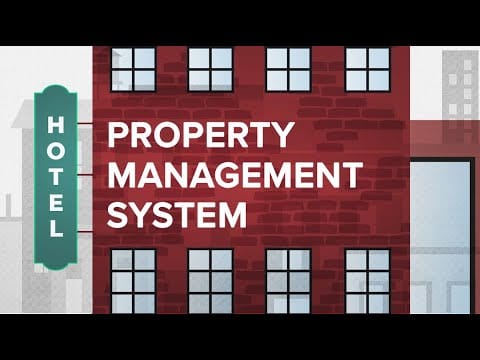

Watch our detailed overview of property management systems to learn more
OPERA's history began back in the 1970s when it was known as Micros. Throughout its history (both before and after it was bought by Oracle and renamed), OPERA was the PMS of choice for Marriott, Four Seasons, Hyatt, Radisson, and more hospitality leaders. By Capterra's estimations, in 2017, OPERA had 26,000 customers and 104,000 users, with many of those eager to grow and compete in the changing travel industry.
In this article, we will explain how hoteliers and hospitality technology vendors can set up an integration between OPERA PMS and third-party hotel solutions.
Property management ecosystem: types of PMS integrations
Why do you need third-party integrations in the first place? Isn’t one software enough? Sadly, no. In a perfect world, a hotel goes directly to the PMS provider, gets the software, and lives happily ever after. But in reality, one product can’t satisfy all hotelier needs.
The future of hospitality is in connectivity. The changing distribution market, constantly shifting customer expectations, alternative hospitality options all make it harder to grow and compete. So, both hospitality technology vendors and hoteliers themselves have been interested in building the system up with modern integrations.
What integrations, you ask? Let’s go through the main features (modules) a modern hotel should cover in a PMS.
The infrastructure of hotel software
Reservations management. Also called a central reservation system, this module holds information about inventory, dates, and availability, and exchanges this data between distribution channels, a channel manager, and your internal system.
Front desk management. Mostly used for check-ins and room management, the front desk software has an overview of room status, processes payments, and operates the self-service kiosks.
Channel manager integration. While channel management software usually exists outside of a PMS, it should be tightly integrated with it. It synchronizes reservation data between many distribution channels and allows you to always keep the information updated and prevent overbooking.
Revenue management. Automated or manual, the task of revenue management (or predicting an optimal hotel room price) is crucial for enabling a hotel to grow and stay competitive. The RM module uses data from other integrated systems to deliver relevant price calculations and automatically update them across the channels.
Housekeeping and maintenance. Often augmented with staff mobility options, this system allows the front office staff to assign tasks to housekeepers, who can react in a timely manner and communicate easily.
Read our dedicated article to learn more about housekeeping management software for hospitality businesses and the top housekeeping providers worth checking out. This includes standalone solutions like ResortCleaning and Flexkeeping and PMS like OPERA and Amadeus, which provide housekeeping modules.
Guest management. This hotel-specific CRM system records guest preferences, their loyalty program growth, and manages pre- and post-stay services.
Reports and analytics. Data from all other systems can pour into automated hotel analytics reports, allowing you to track metrics, analyze performance, and make informed business decisions.
Back office management. Internal admin tasks are operated in the back office. This is where you set up employee shifts, manage marketing activities, keep up with the inventory, and do everything else to make sure the hotel works like a well-oiled machine.
Point-of-sale services. When guests pay for any services outside of their reservation, all transactions should be recorded and operated by a hotel POS system. Integration with guest management and the back office allows you to keep track of your F&B stock, invoice guests, and report your revenue from these extra monetization channels.
Even if many of these features exist in a core PMS such as OPERA 5, it’s rarely the best choice on the market. Oracle admits it by opening several possibilities for integration with its systems and custom development. In the rest of the article, we will explain what these integration possibilities are.
Understanding Oracle Hospitality software
Oracle is a multibillion dollar technology provider with a wide selection of software and hardware products in numerous industries. The full set of hotel management systems from Oracle is provided under the umbrella of Oracle Hospitality. This includes two versions of PMS software (legacy OPERA 5 and modern OPERA Cloud) and a set of guest services called Suite8.
There are two options for independent software vendors who want to build integrations to Oracle Hospitality products:
- Approval-based Oracle Hospitality Integration Partner Program used for integrating legacy solutions OPERA 5 and Suite8
- Self-service Oracle Hospitality Integration Platform (OHIP) that currently integrates only with OPERA Cloud
The use of the word “partner” indicates Oracle's big change in direction. To use the partner program, you must be reviewed by Oracle and pass their criteria. With OHIP, they’re aiming to change that and allow vendors to get around API capabilities without assistance. Currently, OHIP is open only for OPERA Cloud with plans to enable OPERA 5 as well in the future.
But before learning what’s available, let's look in detail at the different PMS products Oracle provides.
OPERA 5
OPERA 5, an older version of a PMS, has a basic list of features (reservations, front desk management, guest profile management, and room management), which can be extended depending on your package: The Lite package provides a choice of 30 out of around 100 features; Standard gives you 55 features; and in the Premium tier, you can pick an unlimited amount. There are also add-ons, purchased separately. Some of them include:
- Central Reservation System
- Sales and Catering
- Vacation Ownership
- Hotel Mobile
- Commission Handling, etc.
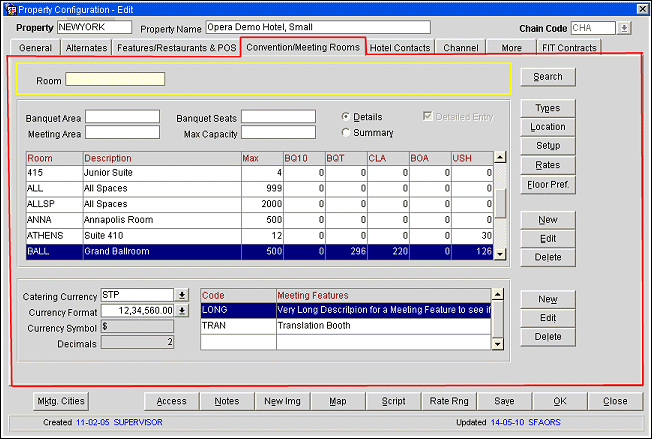
OPERA 5 interface opened on the Meeting Room management tab Source: Docs.Oracle
OPERA 5 is available on-premise or self-hosted.
- On-premise deployment means that the system should be installed on every computer and stored in a physical server. The gist of it is that you should manage your own infrastructure with your own IT effort, but you also have full control over the system’s configuration.
- If you choose the self-hosted option, you can store the system in a private cloud (provided by Azure, Amazon Web Services, Google Cloud, etc.), which makes sense for multi-property hotel groups.
OPERA Cloud
OPERA Cloud is cloud-hosted, so it’s available via a web browser and deployed and maintained by Oracle. This gives the system more capabilities.
- Being device-agnostic, OPERA Cloud can run on mobile devices all around the property, such as employee smartphones and self-service, customer-facing tablets.
- Compared to OPERA 5, the cloud version with its modern user interface developed using today’s design principles makes the system easier to learn and use.
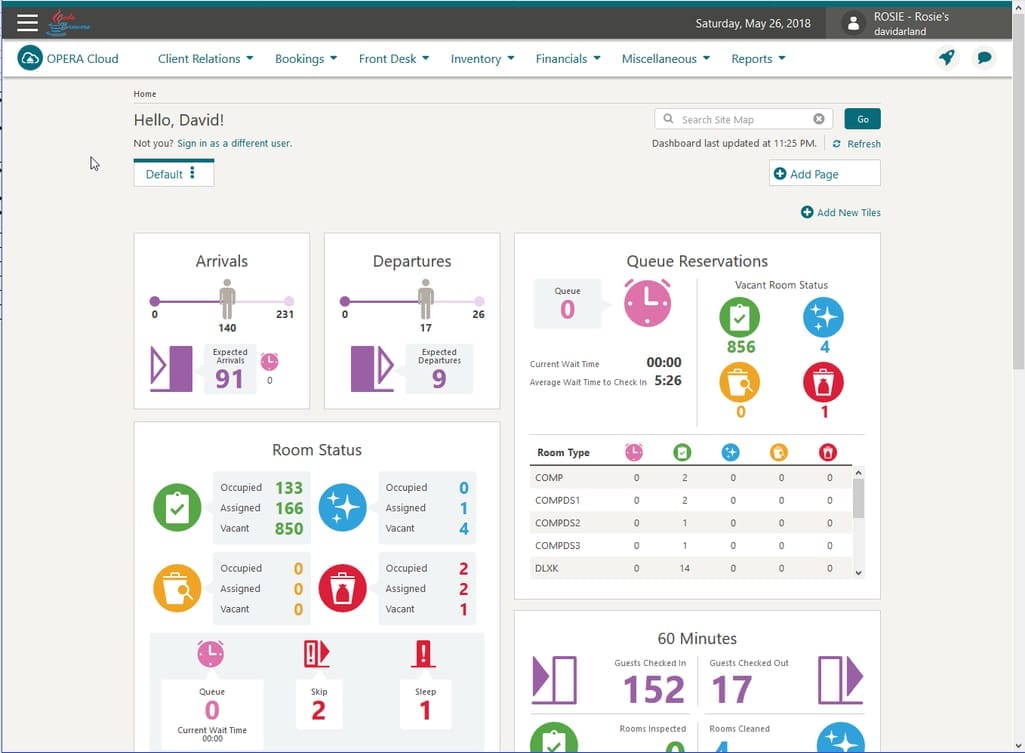
OPERA Cloud dashboard Source: HotelTechReport
OPERA Cloud is also tightly coupled with another product by Oracle -- Micros Simphony point-of-sale system, allowing you to sync hotel operations with food and beverage services to easily handle transactions and enable guest self-service.
Suite8 (Fidelio)
Previously known as Fidelio, Suite8 is a set of guest services combined in a single software. It’s available only in the EMEA (Europe, the Middle East, and Africa) and the Asia-Pacific regions and can augment the existing OPERA PMS capabilities.
This includes such features as:
- a booking engine webConnect that allows guests to book rooms and other services on a hotel’s website,
- leisure management for booking spa and leisure appointments,
- a conference and catering system for managing events and banquets,
- loyalty and membership management for defining different loyalty types,
- a point-of-sale system integrated with restaurants, bars, minibars, etc.
Now, let’s go through two types of integrations and explain how they work.
Integration APIs for OPERA 5 and Suite8
There are two APIs within the partner program: a general API between PMS and external systems and a kiosk API for connecting PMS with kiosk software.
OPERA Web Self-Service (OWS)
OWS is a SOAP API used for data exchange between external applications and OPERA PMS. It lets customers use the search and booking options on a hotel’s website and helps hotel staff administer loyalty membership information or access room information. The API supports the following functionality.
Availability management. The API will return real-time availability information, including meeting room availability data.
Room management. You can update room status and create a room maintenance schedule.
Customer management. Update customer profiles, retrieve past reservations, apply membership benefits, create and cancel bookings, etc.
Extra services. Request and send hotel brochures, authenticate users, and create and update vacation ownership contracts.
The whole list of web service specifications is available here.
OPERA Kiosk Interface
OPERA Kiosk is another web service using SOAP calls that provides a link between OPERA PMS and the hotel kiosk software.
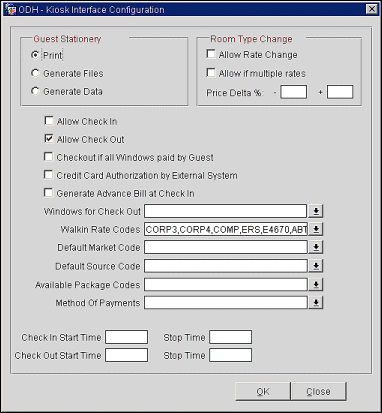
Kiosk interface configurations Source: Docs.Oracle
It allows the hotel staff to specify such kiosk features as:
- check in and check out,
- advance bill on check in,
- credit card authorization by a third-party system,
- viewing reservations paid by the guest,
- name validation between the input name and the name in OPERA PMS,
- methods of payment.
Read more about OPERA Kiosk Interface configurations here.
How to integrate OWS and OPERA Kiosk Interface
As we explained, to integrate with OPERA 5 and Suite8, you must apply for the partner program. If approved, you will have to work with some old-fashioned, but well-standardized technologies created by Oracle.
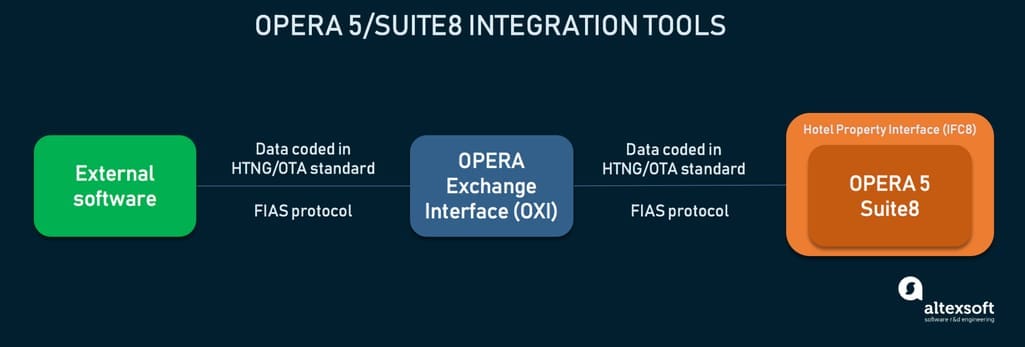
Opera 5/Suite8 integration process
Here’s how it works.
1. Use FIAS protocol. OPERA 5 and Suite8 use the interface configuration system called OPERA Hotel Interface (IFC8). To communicate with this interface, you must use a proprietary protocol created by OPERA called FIAS.
FIAS (or Fidelio Interface Application Specification) is a protocol that can be used by any system to exchange data with OPERA PMS and Suite8. Using the list of specified data types, third-party vendors can create functionality that will be supported in OPERA Hotel Interface (IFC8). FIAS specifications can be found here.
2. Encode data in HTNG/OTA standards. Oracle products support such data standards as HTNG and Open Travel. OPERA supports HTNG 2008b Single Guest Itinerary specs with some proprietary extensions, allowing for sharing guest information and transactions with POS or other activity systems. Open Travel Alliance is another standard developing organization. OTA XML Interface supports data exchange between Suite8 and central reservation systems (CRSs). Find the docs for web service and message specifications of OPERA HTNG Interface here and more information on the OTA formats in this document.
3. Set up communication with OPERA Exchange Interface (OXI). OXI is a tool that serves as a middleware or gateway between OPERA PMS and other hotel software: central reservation systems, channel managers, revenue management systems, etc. It permits data exchange configuration using the XML layout and HTNG standard. The idea is that a hotel has a different OPERA Exchange Adapter for every system they integrate with, which is where they set up the business logic of these integrations. Find all OXI specifications here.
Now, if you want to integrate with OPERA Cloud, you will find it easier as Oracle created a self-service platform for you to do so.
Oracle Hospitality Integration Platform (OHIP) for OPERA Cloud
The Oracle Hospitality Integration Platform (OHIP) is a centralized, self-service portal for hoteliers using OPERA Cloud to connect to REST APIs from the marketplace and for third-party vendors to integrate with OPERA products. OHIP provides all functionality offered by OWS, Kiosk, and OXI and goes beyond that by giving access to virtually every feature in OPERA Cloud.
Developers can use the platform to:
- search for available APIs,
- discover which API resources are available,
- register applications to access API keys in both production and non-production environments,
- manage their applications and APIs subscribed to them,
- view gateway information and copy the gateway URL.
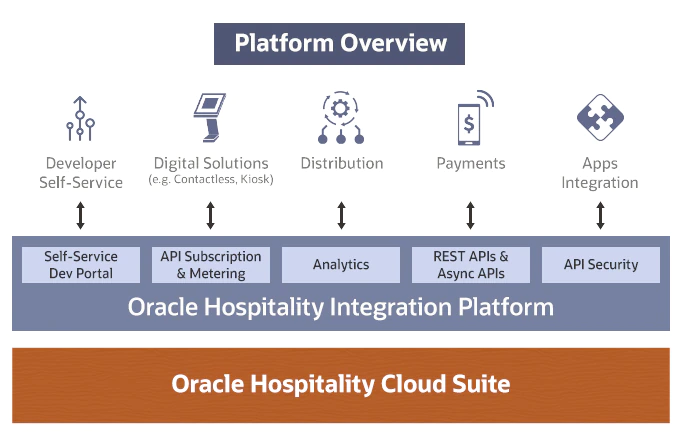
OHIP offers capabilities both for accessing APIs and safely publishing them
There are currently two types of APIs within OHIP: Production APIs and Early Adopter APIs. Let’s review them and explore how you can access them.
Production APIs
The following APIs are available both for production and nonproduction.
- Activity API for overseeing account management operations such as appointments, sales calls, contacts.
- Block Reservation API for managing groups of rooms occupied by guests who attend an event (conference, wedding, etc.)
- Customer Relationship Management API for managing guest profiles.
- Event Management API for managing catering activities.
- Front Desk operations API for managing guest arrivals and departures, sending guest messages, operating housekeeping tasks, and more.
- Housekeeping API for scheduling cleaning and updating room status.
- Inventory API for updating item inventory.
- Price Availability Rate API for managing room inventory, availability, setting room sell limits, etc.
- Rate API to define and manage rate structures, as well as promotions.
- Reservation API for creating and updating reservations.
Early Adopter APIs
Early adopters are members that get access to “version 0” APIs in exchange for providing feedback. Such APIs are also less stable and may result in breaking your applications. The Early Adopter library accounts for over 3000 APIs, so it may be worth it.
Here are some of the APIs available for early adopters.
- Accounts Receivable API for managing debtors’ accounts, invoices, and remittance.
- Cashiering API for access to guest receipt histories, credit card settlements, etc.
- Channel Configuration API for administering distribution channels (basically performing Channel Manager functions).
- Leisure Management API for accessing leisure management functions of OPERA Cloud.
How to integrate with OPERA Cloud using OHIP
Read the full documentation for Oracle Hospitality Integration Platform here. But here's a rundown of steps to show how easy it is.
1. Access Oracle Hospitality Developer Portal. If you’re an independent software vendor, sign in to the Oracle Shop. For OPERA Cloud users, API access is available through their single OPERA Cloud interface. There you can discover APIs, read documentation, and configure the portal by adding users and assigning roles to them.
2. Consider checking early adopter APIs. To opt in, send an email to hospitality_apis_ww_grp@oracle.com with the details of your use case and why you want to use the program. Do this only if you’re ready to share feedback with Oracle and want to contribute to the platform development.
3. Register an application. You can use nonproduction and production environments for your applications. Creating an application will give you an application key and access to the gateway.
4. Authenticate and call to APIs. A hotel administrator should give you access to their integration username and password, which is where you obtain the OAuth token. To call for APIs, use your OAuth token, the application key, and the hotel’s ID in the system, and you’re good to go.
OPERA integration challenges and how to address them
Oracle did a pretty good job on easing the integration with their OHIP product. But if you’re building connectivity with Opera 5, you will experience some struggle.
Getting accepted to the Partner Integration Program. You won’t be able to use OPERA Web Services or Kiosk APIs without some criteria compliance. You must have an existing product, be compliant with the PCI security standard, have an active sales channel, and more. The application form has a full list. Additionally, the validation team may take weeks to respond, so you won’t be able to effectively plan the integration or even use the sandbox environment.
Complying with hospitality data standards. HTNG and Open Travel Alliance standards were created specifically to promote interoperability in hospitality software. While they benefit the industry, they also create an additional step in software development -- vendors first need to study these standards, apply them to their own APIs, and only then be ready for integration.
Slow transition to cloud. Oracle actively encourages their OPERA 5 users to transition to OPERA Cloud. But considering their continuous support for the legacy systems, many of their customers choose to stay. This means that independent software vendors would have to create integrations for both versions if they want to reach a large chunk of customers.
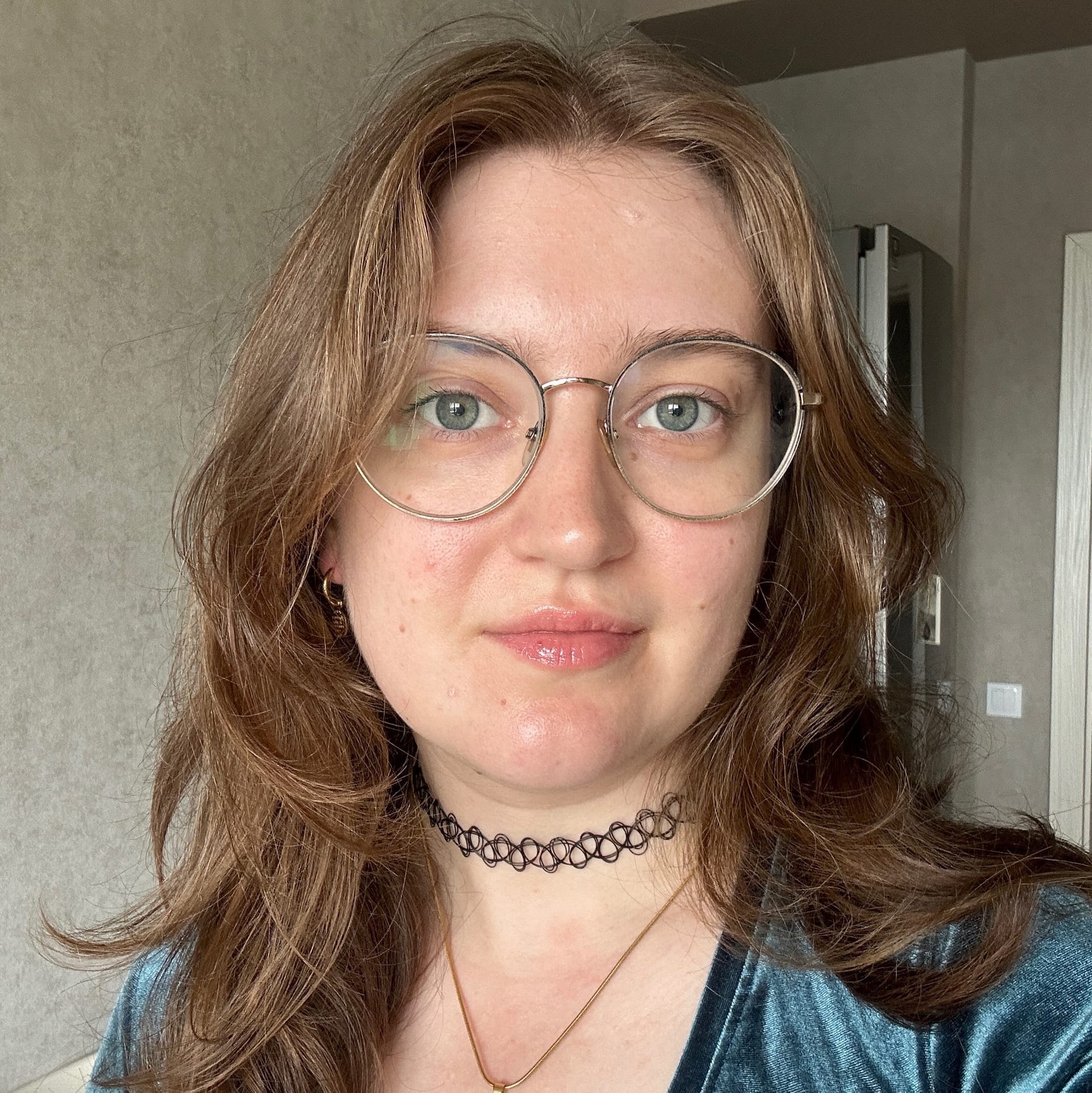
Maryna is a passionate writer with a talent for simplifying complex topics for readers of all backgrounds. With 7 years of experience writing about travel technology, she is well-versed in the field. Outside of her professional writing, she enjoys reading, video games, and fashion.
Want to write an article for our blog? Read our requirements and guidelines to become a contributor.

